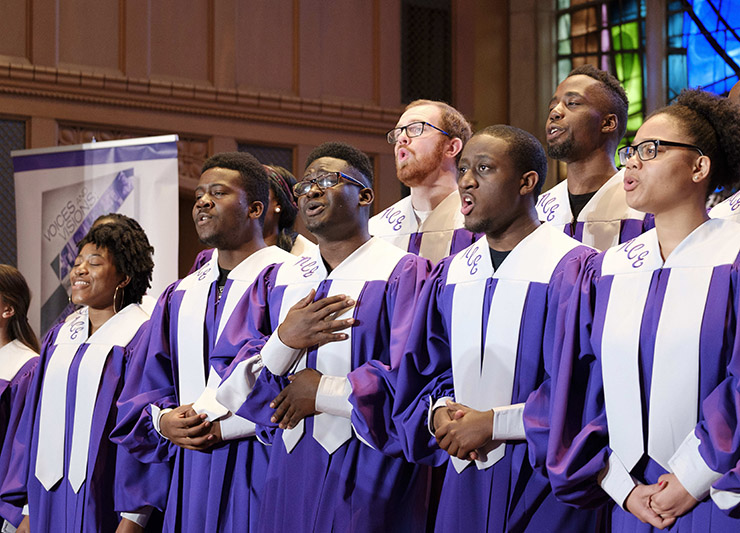EVANSTON - “If yesterday was a day of commemoration, today is a day of celebration,” said Sonia Waiters ’89, vice president of the Northwestern University Black Alumni Association (NUBAA) as she welcomed the approximately 300 attendees gathered in the Alice Millar Chapel for day two of the NUBAA sponsored Bursar’s Office takeover commemoration events.
Conveying raw emotion and a pervasive sense of shared experience, this morning’s (May 4) arts program included a musical tribute performed by the Northwestern Community Ensemble (NCE) followed by a staged reading sponsored by the department of African American studies.
Accompanied by piano, the Community Ensemble’s joyful performances of “Every Praise,” “Hallelujah, Salvation and Glory” and “Fare the Well” had the audience swaying and clapping, and prompted one alumni to stand and say, “I’m in tears because I was here when this choir first marched down this aisle and sang its first song. The current Ensemble continues a ministry that was created 47 years ago to fill a spiritual hole.”
E. Patrick Johnson, chair of Northwestern’s department of African American studies, said the department originated with the advocacy efforts of the gathered alumni.
“My Soul Looks Back and Wonders,” a powerful, sometimes humorous dramatic reading, was performed by current Northwestern students. The work was adapted and directed by Johnson from the book, “Voices and Visions: The Evolution of the Black Experience at Northwestern,” by NUBAA President Jeffrey Sterling ’85 and Lauren Lowery ’08.
The oral history described the experiences leading up to and through the Bursar’s Office takeover from the perspectives of its participants Eva Jefferson Patterson, Wayne Watson, John Bracey, Kathryn Ogletree, Herman Cage, Steve Colson, Clovis Semmes, Victor Goode and Daphne Maxwell Reid.
A recording from that day in 1968 opened the piece, in which a student leader is heard saying, “To any of the white students considering reacting to our demonstration, ask yourself, ‘What has it cost you?’ ”
The students spoke about their confusing and isolating first days on campus, including the indignities of having fellow students requesting new room assignments to avoid having a black roommate, and of black students being denied similar requests. One student spoke about being the only black student in his freshman English class, which was taught by the son of a prominent Ku Klux Klan leader and who let the student know he didn’t belong at the school.
Numbering only 120 at the time, black students were spread out in the dorms, with male and female students on opposite ends of the campus. Lacking a university-sanctioned organization, the students were not allowed to gather and meet on school grounds.
The hostile encounters they experienced led to the formation of the student group For Members Only, which gave them a forum for gathering to identify campus issues.
After months of corresponding with University administration and not getting a satisfactory response, Dr. Martin Luther King Jr.’s assassination inspired the students to take more visible action.
Initially they discussed staging a sit-in, but decided on the peaceful takeover of the Bursar’s Office. Planned wholly by undergraduates, with support and mentorship from graduate students, 100 members of the black student body turned out the morning of the takeover.
While a few students created a distraction that led the security guard away from the office door, the students ran into the building and locked it from the inside. White undergraduate students in support of the takeover formed a defense around the building.
Prompting a huge laugh from the audience was Daphne Maxwell Reid’s story about phoning her mother from inside the Bursar’s Office to let her know where she was, to which her supportive mother replied, “Call me if you need me to send bail money.” Reid also recalled how in an effort to avoid missing a doctor’s appointment, she climbed out the window, went to her appointment and then climbed back in.
The student protestors reflected on what they had learned.
One mourned the loss of his youth, saying instead of being a carefree college student, he felt they had no choice but to shoulder the burden of making change.
Another shared that she came out of the experience naively thinking change could be made in the world as quickly as the students had with the Bursar’s Office.
The 45-minute oral history concluded with their collective voices raised and echoing that in spite of the gains, “the struggle continues.”


